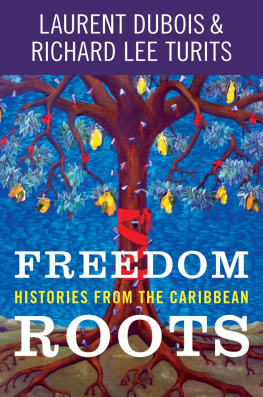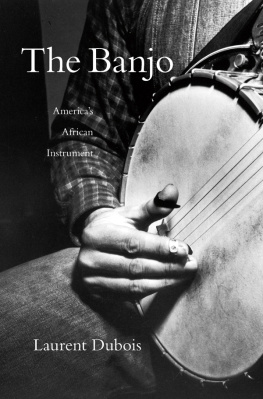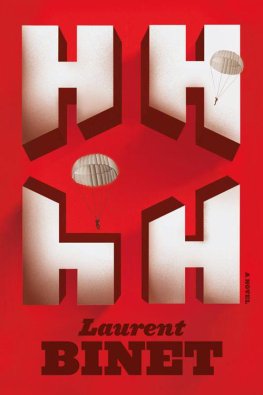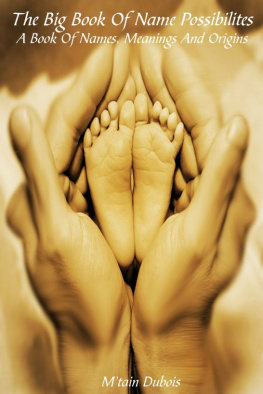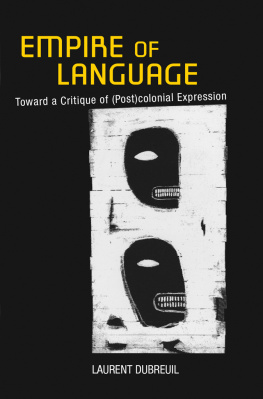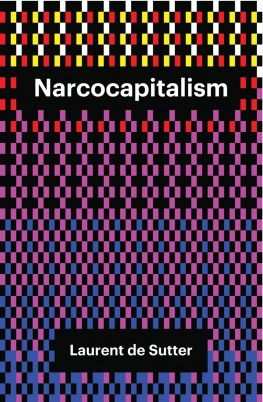Laurent Dubois - A Colony of Citizens
Here you can read online Laurent Dubois - A Colony of Citizens full text of the book (entire story) in english for free. Download pdf and epub, get meaning, cover and reviews about this ebook. year: 2012, publisher: Omohundro Institute & University of North Carolina Press, genre: Politics. Description of the work, (preface) as well as reviews are available. Best literature library LitArk.com created for fans of good reading and offers a wide selection of genres:
Romance novel
Science fiction
Adventure
Detective
Science
History
Home and family
Prose
Art
Politics
Computer
Non-fiction
Religion
Business
Children
Humor
Choose a favorite category and find really read worthwhile books. Enjoy immersion in the world of imagination, feel the emotions of the characters or learn something new for yourself, make an fascinating discovery.

- Book:A Colony of Citizens
- Author:
- Publisher:Omohundro Institute & University of North Carolina Press
- Genre:
- Year:2012
- Rating:4 / 5
- Favourites:Add to favourites
- Your mark:
- 80
- 1
- 2
- 3
- 4
- 5
A Colony of Citizens: summary, description and annotation
We offer to read an annotation, description, summary or preface (depends on what the author of the book "A Colony of Citizens" wrote himself). If you haven't found the necessary information about the book — write in the comments, we will try to find it.
A Colony of Citizens — read online for free the complete book (whole text) full work
Below is the text of the book, divided by pages. System saving the place of the last page read, allows you to conveniently read the book "A Colony of Citizens" online for free, without having to search again every time where you left off. Put a bookmark, and you can go to the page where you finished reading at any time.
Font size:
Interval:
Bookmark:
A Colony of Citizens
REVOLUTION & SLAVE EMANCIPATION IN THE FRENCH CARIBBEAN, 17871804
LAURENT DUBOIS


Published for the Omohundro Institute of Early American History and Culture, Williamsburg, Virginia, by the University of North Carolina Press,
Chapel Hill and London
The Omohundro Institute of Early American History and Culture is sponsored jointly by the College of William and Mary and the Colonial Williamsburg Foundation. On November 15, 1996, the Institute adopted the present name in honor of a bequest from Malvern H. Omohundro, Jr.
2004
The University of North Carolina Press
All rights reserved
Set in Monticello and Bickham types
by Tseng Information Systems, Inc.
Manufactured in the United States of America
Library of Congress
Cataloging-in-Publication Data
Dubois, Laurent, 1971
A colony of citizens : revolution and slave
emancipation in the French Caribbean,
17871804 / Laurent Dubois.
p. cm.
Includes bibliographical references and index.
ISBN 0-8078-2874-2 (cloth : alk. paper)
ISBN 0-8078-5536-7 (pbk. : alk. paper)
1. West Indies, FrenchHistory. 2. Slaves
EmancipationWest Indies, FrenchHistory.
3. Slave insurrectionsWest Indies, French
History. I. Title.
F 2151.D 83 2004
326.80972976dc22 2003019519
The paper in this book meets the guidelines for permanence and durability of the Committee on Production Guidelines for Book Longevity of the Council on Library Resources.
This volume received indirect support from an unrestricted book publications grant awarded to the Institute by the L. J. Skaggs and Mary C. Skaggs Foundation of Oakland, California.
cloth 08 07 06 05 04 5 4 3 2 1
paper 08 07 06 05 04 5 4 3 2 1
For Guadeloupe
This book was born of travels back and forth across the Atlantic, from Michigan to Aix-en-Provence, from Guadeloupe to Paris, travels through which I have accumulated unpayable debts and invaluable friendships. It began as a dissertation at the University of Michigan, where I was surrounded by nurturing teachers. Throughout, Fernando Coronil inspired and pushed me with his intellect and passion for the possibilities of using knowledge for the present and the future. I thank him for his example and friendship. Rebecca Scotts contagious energy and intellectual example shaped this project, and she constantly communicated to me both the opportunities and responsibilities that come with historical work. Julius Scott, who travels in the same historical waters I do, has inspired me through his ability to bring to life the world of the Caribbean in ways I can only hope to emulate. Ruth Behar, David Bien, Frederick Cooper, Simon Gikandi, and Ann Stoler all contributed in important ways to the evolution of the project. I owe a great deal to my fellow travelers at Michigan, who heard more than they wanted to about Guadeloupe as we grew into an intellectual family. Martha Baker, Paul Eiss, Mandana Limbert, Setrag Manoukian, and Steven Pierce read drafts of various chapters. David Pedersen always got me thinking about my categories. And with Aims McGuinness I shared the joys of writing about seemingly marginal places.
During my first year of research in Aix-en-Provence, conversations with Marie-Jose Bussenius, Priska Dgras, Edris Makward, and Adlai Murdoch gave early direction to my research. Conversations with Assia Djebar, whose work of memory is a model for me, stirred my imagination. As I first stumbled into the archives, I had the remarkable luck of finding Stewart King there. Stewart was working in the notarial registers of Saint-Domingue for his dissertation, now a book, and with startling generosity showed me his methods, including his well-constructed database, on which I modeled much of my research. It was also in Aix that I met Gary Wilder, and our conversations over French cafeteria food initiated an enduring intellectual camaraderie. Garys humor keeps me laughing even when he isnt around, his work has influenced this book profoundly, and the promise of continuing discussions with him has made the work of research and writing worthwhile.
A fortuitous encounter at the Archives nationales in Paris led to a fruitful dialogue with Patrick Weil, whose input has been fundamental in the development of my ideas on citizenship and the meaning of Republican culture. His center (CEPIC) provided a home base in Paris, and he helped me bring the eighteenth century into dialogue with the twentieth, both through the seminar he organized and by inviting me to be part of a government commission on immigration reform in the summer of 1997. Conversations with Erik Bleich and Daniel Cohen, fellow researchers at the CEPIC during 19961997, as well as with Carlo Celius and Myriam Cottias, were also vital in the development of ideas. Patrick furthermore opened doors that enabled me to publish a part of my dissertation in 1998 under the title Les Esclaves de la Rpublique: LHistoire oublie de la premire mancipation, 17891794 , with Editions Calmann-Lvy (Paris, 1998). My editor there, Olivier Nora, was generous to take a risk on the book. The reviews of Les Esclaves de la Rpublique and the conversations I had with readers helped me to rethink and expand my ideas herein. Michel Girauds enthusiasm for the book honored and encouraged me. And there was little more I could wish for once I learned my book was being sold at the supermarket in Basse-Terre.
For my 19961997 year in Paris, I thank the Franco-American Commission for Educational Exchange, which oversaw the Fulbright grant that allowed me to do my research. Further research in France and Guadeloupe was funded by a grant from the Georges Lurcy Charitable and Educational Trust. The beginnings of the project were nurtured by a Pre-Dissertation Fellowship from the Council for European Studies at Columbia University and a Hewlett-Rackham dissertation grant from the University of Michigan. The staffs of the Archives nationales and the Bibliothque nationale in Paris, the Archives historiques de larme de terre in Vincennes, the Centre des archives doutre-mer in Aix-en-Provence, the Archives dpartementales de la Guyane, the William L. Clements Library at the University of Michigan in Ann Arbor, and the Library of Congress provided invaluable assistance through my years of research. And Laird Pruixsma did me an enormous service by creating a computer program that converts Republican dates to Gregorian ones.
For his teachings I thank Erol Josu, who introduced me to the world of Vodou in Paris and in so doing changed my vision of the past and the present. I also thank Lionel Saintval for his friendship. In Guadeloupe, Brigitte and Hugues Delannay were infinitely hospitable; their vision of their islands history shaped this project, and their family introduced me to Voukoum. During trips to Guadeloupe and Paris, I was also lucky enough to come to know Daniel Maximin, whose writing, cultural work, and enthusiasm for bringing history alive inspired me throughout this undertaking. I thank Ghislaine Bouchet, the Director of the Archives dpartementales de la Guadeloupe, for her hospitality, as well as Carlomann Bassette, Christian Froleau, Dimitri Garnier, and Sainte-Croix Lacour. Frderic Rgent, who knows more than anyone about the archives and the history of revolutionary Guadeloupe, generously shared portions of his dissertation-in-progress with me. He is the only person with whom I could hotly debate precisely which wigmaker from Basse-Terre had signed a certain petition. I am also grateful to Fabien Marius-Hatchi for sharing his work with me.
Font size:
Interval:
Bookmark:
Similar books «A Colony of Citizens»
Look at similar books to A Colony of Citizens. We have selected literature similar in name and meaning in the hope of providing readers with more options to find new, interesting, not yet read works.
Discussion, reviews of the book A Colony of Citizens and just readers' own opinions. Leave your comments, write what you think about the work, its meaning or the main characters. Specify what exactly you liked and what you didn't like, and why you think so.

